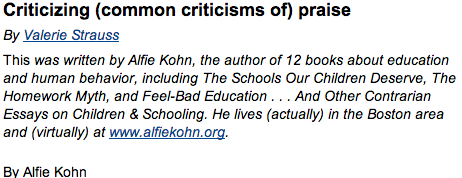alfie kohn

Every educator, in fact every citizen, needs to know how profoundly mistaken are the specific empirical claims that we keep hearing on C-SPAN regarding the relationship between school achievement and jobs, and regarding the relative status of U.S. students. Yong Zhao recently did a fine job of rebutting the specific contentions enunciated in the State of the Union address. As Harold Salzman and B. Lindsay Lowell have reported, very few jobs require advanced proficiency in STEM subjects and there is actually “an ample supply of [science and engineering] students whose preparation and performance has been increasing over the past decades.” In fact, “each year there are more than three times as many [science and engineering] four-year college graduates as S&E job openings.”
Above quote from a Huffington Post article (2011), tweeted by @willrich45 (2013)
_____________________
Find/follow Alfie on wikipedia
and/or on his site:
_____________
http://www.huffingtonpost.com/alfie-kohn/education-journalism_b_3817401.html
Recycled Assumptions: How Journalists Keep Education Tied to Damaging Ideas
_____________
on criticism of praise
– posted 2012 in washington post:
[graphic links to entire post]
highlights perhaps:
Praise isn’t feedback (which is purely informational); it’s a judgment — and positive judgments are ultimately no more constructive than negative one.
Some years after laying out these concerns, I came to realize that praise was troubling in yet another way: It signals conditional acceptance. Children learn that they’re valued — and, by implication, valuable — only when they live up to the standards of a powerful other. Attention, acknowledgment, and approval must be earned by doing a “job” that someone else decides is “good.” Thus, positive reinforcement is not only different from, but antithetical to, the unconditional care that children need: to be loved just for who they are, not for what they do. It’s no surprise that this strategy was designed to elicit certain behaviors rather than to promote children’s psychological health.
But the critical distinction between effort and ability doesn’t map neatly onto the question of praise. First of all, while it’s impossible to dispute Dweck’s well-substantiated contention that praising kids for being smart is counterproductive, praising them for the effort they’ve made can also backfire: It may communicate that they’re really not very capable and therefore unlikely to succeed at future tasks. (If you’re complimenting me just for trying hard, it must be because I’m a loser.) At least three studies have supported exactly this concern.
perhaps too – praise for effort exciting more effort.. of whatever they were doing .. rather than ongoingly.. them questioning what they are doing as well
ie people see and think I’m working hard at this…but does the this matter to me.. today?
Third, to the extent that we want to teach the importance of making an effort — the point being that people have some control over their future accomplishments — praise really isn’t required at all. (Dweck readily conceded this in a conversation we had some years ago. Indeed, she didn’t seem particularly attached to praise as a strategy and she willingly acknowledged its potential pitfalls
..praise is more likely to function as a tool for imposing our will and eliciting compliance.
The problem is with our need for control, our penchant for placing conditions on our love, and our continued reliance on the long-discredited premises of behaviorism.
________________
risk of tougher standards in education
May 4, 2006, Alfie ..to a near capacity crowd at the Wosk Centre for Dialogue as part of the Simon Fraser University Faculty of Education’s “Education Matters Lecture Series”.
i think this talk was in 2010.. ? posted as – If you missed Alfie’s presentation about “The Deadly Effects of Tougher Standards in Education: Challenging High Stakes Testing and Other Impediments to Learning”.
54 min – on my good days.. i think the accountability movement is totally screwed up. on my bad days.. i think it’s working out exactly as it was planned
1:26 – linda mcneal – measurable outcomes may be the least significant results of learning…
1:35:30 – bad policies/unjust laws will continue only for as long as we cooperate with them..
1:38 – only time you need a standardized anything is if you want to compare
__________
on fixed mindset..
The more serious concern, however, is that what’s really problematic is praise itself.
[..]
no mindset is a magic elixir that can dissolve the toxicity of structural arrangements.
____________
@alfiekohn
New blog post: “Why Lots of Love (or Motivation) Isn’t Enough”: alfiekohn.org/blogs/lots-of-…
[..]
I tend to focus on the distinction between loving kids for what they do and loving them for who they are.
[..]
The crucial determinant of stability, in turn, seems to be unconditionality.
trust .. can’t be conditional – as you are nes – otherwise just judgment
[..]
When adults control children, they end up promoting an introjected style that often results in learning that’s rigid, superficial, and ultimately less successful. Many older students have very effectively internalized a compulsion to do well in school. On the outside they look like admirably dedicated students, but they may have mortgaged their present lives to the future: noses to the grindstone, perseverant to a fault, stressed to the max. High school is just preparation for college, college is just an occasion for collecting credentials for whatever comes next. Such students may be skilled test-takers and grade grubbers and gratification delayers, but they’re often motivated by a perpetual need to feel better about themselves rather than by anything resembling curiosity.
True, these students no longer require carrots or sticks. They don’t need discipline because they’re self-disciplined. . . in a way that’s disturbing. Their motivation is internal, but it sure as hell isn’t intrinsic. And that key distinction would go unnoticed if we had just asked whether they had internalized certain values rather than inquired about the nature of that internalization.
[..]
If we know better, why do so many of us act as if things like love, motivation, self-esteem, and internalization come in only one variety? Might we focus on how much of “it” someone has because of our culture’s preoccupation with quantification and data?[3] Or is it just that we’ve never been invited to consider the practical ramifications of the fact that none of these concepts is actually unitary?
school.. anti unitary…
it’s compulsory existence/attendance and prescribed curricula requires we condition our trust in people.
_______
dec 2016 – unorthodox ideas about ed
competing.. where i can succeed only if you fail.. the case against competition
great alt to competition.. coop..
does make sense to have extrinsic motivators… why competition doesn’t work.. it’s an extrinsic motivator
competition justified as part of human nature… what is human nature.. why do we focus on neg possible elements
push beyond the way the discussion has been framed
_______






















